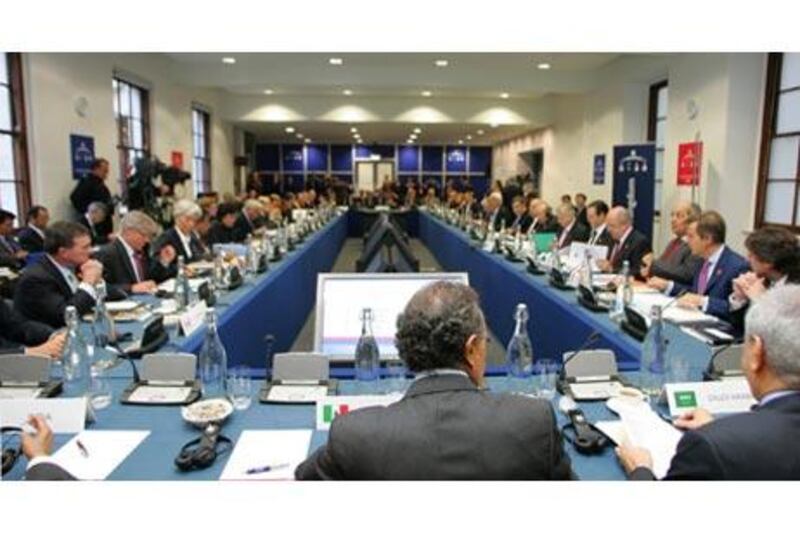LONDON // The stimulus is here to stay, as are bankers' bonuses, despite French and German opposition. Finance ministers from the Group of 20 (G20) leading and emerging economies agreed yesterday to maintain economic stimulus measures after the British prime minister Gordon Brown warned against ending emergency spending prematurely and cancelling rescue programmes.
They also agreed that banks should hold more capital and reduce the scale of their leverage ratios. The tone for the meeting was set by the man who was arguably quickest to react to the global crisis a year ago. "It would be an error of historic proportions if we were to repeat the errors of the 1930s," Mr Brown told finance ministers in London yesterday. "The risks still very much remain. To start now reversing the extraordinary measures would be a serious mistake."
Ministers agreed to continue emergency aid to their economies as they plan strategies for withdrawing it, according to a German official who spoke on condition of anonymity. The US Treasury secretary, Timothy Geithner, is pressing for a global agreement by the end of next year that would require banks to increase the amount and quality of their capital by 2013 to protect against future losses. France and Germany said existing Basel rules, which the US has signed up to but failed to implement, were sufficient to do the job.
Recommendations from the G20's finance ministers and central bankers will be used to craft an agenda for a summit of leaders in three weeks in Pittsburgh. The reluctance of the French finance minister, Christine Lagarde, to embrace Mr Geithner's strategy reflects Europe's annoyance that its financial sectors have been left at a disadvantage by the US's inability to implement a rewrite in 2003 of the so-called Basel II bank-capital standards.
Although the US signed up, enactment of the standards became bogged down amid disagreement among regulatory agencies and the onset of the financial crisis. The politicians arrived in London as a report in the US signalled recovery will be prolonged. Unemployment reached a 26-year high in August, even as the pace of job losses slowed. Such mixed signals are preventing them from declaring victory over the recession and reversing record low interest rates, as well as US$2 trillion (Dh7.35tn) in financial stimulus packages.
Alistair Darling, the British chancellor of the exchequer, and the German finance minister Peer Steinbrueck were among the officials who began talks in London yesterday, saying it was too soon to unwind measures that Mr Brown estimated were worth $5tn. But they promised to start outlining how they will eventually do so. "The time to start implementing an exit strategy is when you have seen the job through," Mr Darling said. "One of the biggest risks is saying the job is done, now we can throttle back. We have made those mistakes before."
The IMF raised its forecast for global growth next year to 2.9 per cent from the 2.5 per cent it predicted in July, a government official from one of the G20 countries said. The IMF also reduced its projection for the global contraction this year to 1.3 per cent, from a 1.4 per cent drop. According to Mr Steinbrueck, officials should start discussing how to remove the enormous liquidity in financial markets before it causes inflation and increases government borrowing costs.
"It's necessary to prepare for a situation when the economic and financial crisis hopefully will be overcome," Mr Steinbrueck said. "One can't talk about the concrete point in time just yet." Countries should ultimately co-ordinate steps when the time comes to withdraw stimulus, Ms Lagarde said. Failure to unite would risk fanning inflation, leading to uneven debt burdens, and may distort markets.
"It should be done together," Ms Lagarde said. "What the timing will be for each country will depend on the fabrics of the economy, on the status of where it is, on its size. We must have this co-ordination among ourselves." * with agencies rwright@thenational.ae





